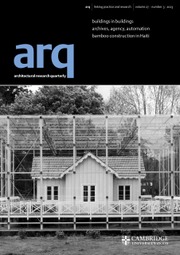Article contents
Dementia, ageing, and the city: learning from the streets of Melbourne
Published online by Cambridge University Press: 06 July 2018
Extract
One of the most difficult challenges associated with an ageing population will be a significant increase in the number of people living with dementia. In Australia, this number is estimated to triple by 2050; a situation that is reflected globally. This will place increased demands on health and long-term care providers but it should also force an examination of the ability of contemporary cities to facilitate or constrain inclusion. Globally, designers and students of this discipline are contributing their skills to the challenge of dementia but solutions are typically proposed at a product, institutional or suburban scale. This paper will present two propositional projects, created using a speculative design methodology within a design studio at The University of Melbourne, that provoke architects to more seriously interrogate what it means for a city to support social inclusion, independence and choice for those who are ageing in place. These projects illuminate new avenues for critical and necessary research. This paper will begin with a reflection on the limitations of the Hogeweyk Dementia Village (Amsterdam), considered the current gold standard in dementia design, to highlight the value of thinking speculatively within the context of dementia; to disrupt the limitations of contemporary design thinking and ask what role the architect can play in improving the lives of those living with dementia?
- Type
- Design
- Information
- Copyright
- Copyright © Cambridge University Press 2018
- 3
- Cited by




